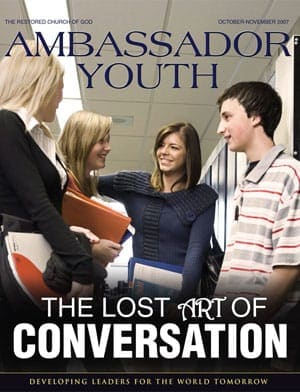Mankind’s ability to interact through seemingly countless modes of communication is accelerating at an unprecedented rate. As a result, the world is becoming smaller.
Ironically, as advances in telecommunications increase people’s ability to communicate, the quality and depth of their interaction is rapidly degenerating. This trend is especially true among the vast majority of young people who spend their lives “speaking” to each other through instant messaging, “grammarless” blurbs of text messaging, and short comments on social networking sites, such as Myspace and Facebook.
There are many adverse effects to this troubling reality—and one of the most problematic is teens’ deteriorating ability to interact with others verbally. This lack of meaningful communication has limited most teenagers’ ability to build true friendships with their peers. It has also widened the generation gap, making it increasingly difficult to learn important lessons from those of older, more experienced generations, such as parents and grandparents.
However, by taking action now you can recapture the lost art of conversation and build a skill sorely missing from today’s younger generation. Developing your verbal communication skills will build better friendships between you and other teens. But more importantly, it will prepare you for future success by strengthening your “word power”—a precious tool that will benefit you in future relationships, increase your attractiveness to potential employers, and provide a foundation for becoming a leader later in life.
Replacing the Spoken Word
Long gone are the days when teenagers talked face-to-face with each other. They now live in a world filled with chirping text message alerts and the constant interruption of their ringing or vibrating cellphones.
Based on a recent study by Disney Mobile and Harris Interactive, which tracked the cellphone habits of children and teens ages 10-17, 44% said that text messaging is their primary form of communication—ranked even ahead of talking!
During the summer, teens spend an average of 3 hours and 45 minutes per day talking and texting on their cellphones. They are often so dangerously preoccupied with the habit that almost 50% admitted to text messaging while driving!
Sadly, this is more than a summer phenomenon; nearly two of three students acknowledge making calls and texting during class.
The next time you are in a public setting, take a moment to observe a typical group of teens. They practically ignore each other to “communicate” with others on their cellphones, aimlessly chattering or quickly typing text messages.
The home was once a place of refuge where families could talk and build strong bonds after long days at work and school.
No longer: 25% of teens admit to “routinely” text messaging at the dinner table. Perhaps more stunning is that one quarter of children ages 10-11 own cellphones! While many parents justify this as necessary to stay in touch with them, only 4% of youth use their cellphones to talk to their parents on a regular basis.
In addition, 35 million (55%) children and teens grades K through 12 use social networking Internet sites, according to research by the United States Senate. Even while talking on their phones or texting, teens spend a staggering number of hours on these sites communicating through instant messaging and “comment” posts. Over half of America’s youth acknowledge talking to strangers frequently, via computers—replacing real friends with “e-friends.”
All of this empty communication is a waste of countless hours at best. At worst, it is robbing young people of the opportunity to interact with friends and family members in a meaningful way. Teens are wasting their adolescence building meaningless relationships and creating counterfeit friends through electronic devices rather than lasting relationships based on real-world experiences and verbal interaction.
In this age of cellphone gossip, shallow messaging and endless social networking chatter, there are positive steps you can take to enhance your ability to speak and carry on a productive conversation.
Give Yourself Something to Talk About
Before starting a meaningful conversation, it is important to recognize the most important step: have something to talk about!
It was once said, “It’s a good thing that the weather changes often, because if it didn’t 90% of people would have nothing to talk about.” How true! Many simply do not say anything interesting or worthwhile. Be sure you are not one of them.
- Read books or magazines. Learning about a wide range of subjects will increase your vocabulary and general knowledge.
- Pay attention to local, national and world news—it’s not just for adults.
- Experience something new or attempt a new activity (using good judgment and moderation, of course). Whether hiking, cooking or planting a garden, it doesn’t matter. Trying something new will not only be fun, but will broaden your horizons.
- Set aside time to talk with someone from a different generation. Even if it is a familiar family member, you will find that a lifetime of experiences provides a person with many interesting stories and valuable lessons to share.
These simple things will give you something interesting to talk about and may provide you with new stories to tell—all of which are infinitely more interesting than talking about the weather!
Listening—A Valuable Tool
People have grown accustomed to focusing almost exclusively on themselves. Most are only concerned about expressing their own likes and dislikes—what they have done—what they want to do—or what physical objects they desire.
Through online social networking, teens design personal homepages primarily as a forum to express “who they are.” This inordinate focus on the “self” has greatly contributed to young people’s inability to communicate effectively, since half of a conversation involves the other person.
Jesus Christ said, “It is more blessed to give than to receive” (Acts 20:35). One of the best ways to practice His instruction is to listen. The apostle James instructed those desiring to live God’s Way to be “swift to hear and slow to speak” (Jms. 1:19).
In a world focused primarily on the get way of life, it should come as no surprise that most do not understand that giving one’s time and practicing the art of listening is a great way to give. Being a good listener is actually self-serving (but in a good way): You will learn new things and form a bond with the person with whom you are speaking as you learn more details about his or her life. Listen and let the words of the person you are talking to “soak in.” Comment on what he or she is saying and ask questions.
We all have been in situations in which no matter what you said to a particular person, the conversation always seemed to turn back to him. When talking, certain people are only interested in themselves. They focus entirely on what they want to say instead of sharing the conversation with the other person. This attitude is another way of being focused on the “self” and practicing the way of get. You can avoid this by listening intently and absorbing what the other person is saying. You may learn something new as well as increase your ability to conduct a meaningful conversation.
Take Initiative!
Lacking proper verbal communication skills and having the tendency of being self-focused produces disastrous side effects. One of the worst effects is that most are simply not confident in or comfortable with approaching others.
Ask yourself: What if every person in a room waited for someone else to talk to them? The result should be obvious. No one would ever meet new people or even begin a conversation!
Take the initiative. The next time you are in a social setting, walk up to someone you have never met and introduce yourself. Although this may sound frightening to those who lack confidence, this is the best way to meet new people, and it will help you build an attractive personality. People are naturally drawn to those who appear confident and outgoing, even when among strangers.
Consider also that many are shy themselves, and think, “I wish someone would come up and talk to me!” So remember, even though you may be uncertain at first, walk up to someone you don’t know, offer your hand with a smile and introduce yourself.
A Tool for Growth and Future Success
Look at nearly all the most prominent figures throughout history and you will find people who were capable and comfortable when it came to the spoken word. This is true in politics, business and any area or profession in which successful leaders are found. True leaders have the ability to verbally express themselves with confidence.
If this is true of those who want to build a successful career, how much more true is it of Christians, who are instructed to continually learn, grow in and refine their character? Verbally interacting with others in a meaningful way is an essential tool in developing the whole person.
Do not fall prey to the shallow communication that surrounds you daily. Build your skills with the spoken word and you will be a more interesting person, build a more attractive personality, create and develop deeper friendships—and, most importantly, it will help you grow in godly character. Master the lost art of conversation!


















